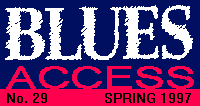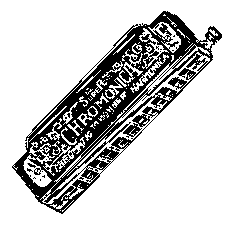

 | ||
| The Doctor is In! |

Is there no end to the confusion and ignorance of the world? For instance, who puts the orange-juice container back in the fridge with one teaspoon of juice in it? Is this the kind of stuff that makes Arafat so ugly? Has he had his colors done? How come I've never seen him and Ringo Starr together? I wonder if Arafat's a better drummer? Did I take my medication today? Wonder if the mail carrier brought me anything, even a little hostess gift? Wait, here's a letter from a soul in pain, with postage due ... Is there no end to the confusion and ignorance?
Dear Harpo,
I have been playing for 13 years, and I know I'm pretty good. I can play anything recorded by any harp player except Charlie Musselwhite -- but who can, besides him? The problem is: I think I'm burnt out. I feel like I've played it all before and heard it all before, but I know there is more to be done on the harp than I'm doing or hearing. I still love playing, but I need a breakthrough. Help!
Doug LePetomaine
Concord, Massachusetts
Idly sipping the sample of Pert Plus that was hidden by LePetomaine's plea for a lighthouse in a sea of bad metaphors, the head that weighs heavy with the burden of the beanie of musical genius topped with the propeller of creative fire and your choice of three tangy sauces engages in thoughts that only dogs can hear. We should be so lucky.
Dear Doug,
There is life after I-IV-V, just as harp playing didn't stop progressing after Little Walter died. Your situation is a common one, and after 13 years you've worn a pretty deep rut in your playing, from the sound of it. Don't worry, there is hope.
At the risk of sounding a bit like a new age guru, you need some new neural pathways. You don't have to wait for the holographic Docto on Star Trek Voyager; you can start today. Actually, starting today is what it's all about. Read on.
Remember when you first started playing and you felt like you had a Dumpster in your mouth instead of a harp and your tongue was as sleek and agile as a sea cucumber? Gradually, though, things became less of a conscious effort, and before you knew it, you could play a tune without thinking about every movement of the involved components.
There you go. The act of playing the now-easy tune was accomplished through the establishment of neural pathways that put you on automatic pilot after enough repetitions of a series of movements. Your brain lays down a pattern of sequential nerve firings that make physical activities go from being painfully difficult to so easy that you don't think of them at all. You know the old expression about riding a bike ...
The downside to this neural pathway process is that it becomes so ingrained that you have to work at not falling into the nice comfortable rut you established when you reached the "Jeez, you're good!" stage in your playing. To really do this right, you have to continually start over, as if you're a beginner.
How to do this? You have to force yourself to feel stupid, inept and frustrated. Sound good?
1) Turn your harp over and play upside down.
2) Play with no hands. (And perhaps think of wearing a bib when you do!)
3) Put duct tape over half of the holes on your harp and do solos and accompaniment in that five-hole range. Start with the area you play least -- indicated by a lack of lip-prints on the reed covers -- and work down to series of four, three or even two holes.
4. Use one harp for every song. The same harp, that is.
If you purse your lips, then try tongue blocking. Tongue blockers? Well ...
The reason Charlie Musselwhite is so hard to touch is that he's the master of all the various positions on the harp. He put out a book years ago which covered the subject in detail, as well as the theory behind it. It's worth searching for. It's called Power Blues Harp, and it's still in print from Mel Bay Publications from Kevin's Harps at (609) 298-1524.
Which segues us nicely from the physical to the intellectual training required to be a born-again harp player.
Most harp players are self-taught -- players by ear. This is fine, but it gives you a narrow scope. Any decent local or college bookstore (the kind without peep shows and plastic covers on the books) will have numerous music-theory books. And while you're at it, why not go legit and take a music-theory course? You might be surprised.
Talk to other musicians, especially players of other instruments, for ideas on how to play around the chords of a song and how they construct solos. Talk with older pros; they're the ones still playing and getting paid for it. Listen to saxophone players, horn players, guitarists, violinists, singers, anyone you like, for solos you can try to copy.
Train your ear. Listen to a different type of music. Think beyond typical I-IV-V progressions. Find harp combinations that fit different chord changes.
In short, put yourself on a stretching program. You might as well be the next trend setter!
The pataphysician of the musical mouth organ puts down his pen and opens the door to his home gym. A can of long-ago congealed house paint falls off the top shelf and conks him on the noggin, dislodging a carefully taped-on propeller blade. Pushing aside various articles of indeterminate usefulness, he settles in at his multi-function Lips-Ercizer, recently purchased from QVC for $39.95. Thinking about what a good example he's setting for his patient readers, he goes back to sleep.
Send your question for the dippy Doc of permanent lip-lock to:
 |
 |